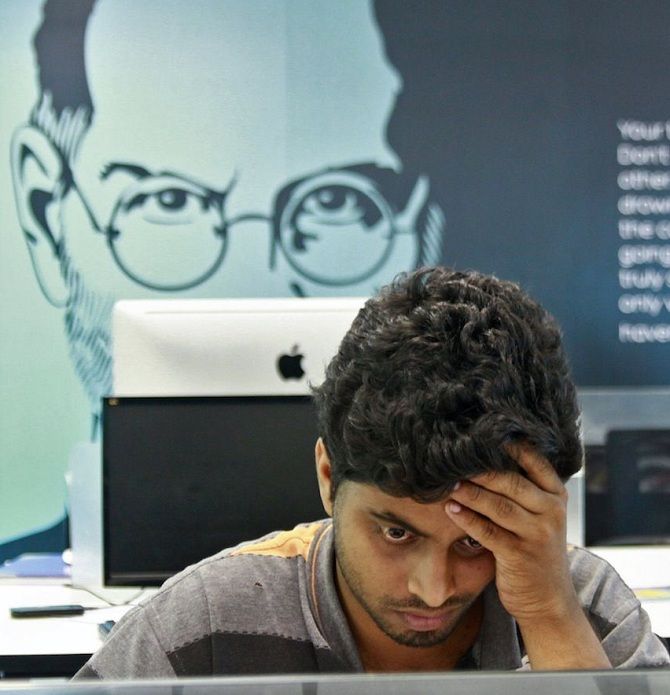The challenges before the industry are many today and its response over the coming months will shape the future of what has been one of the most vibrant value-creating and livelihood-enabling sectors of corporate India, says Ganesh Natarajan.

In the last 30 years and more, the information technology industry in India has seen wave upon wave of negative news that threatened to upset the applecart, but the industry has shown resilience and confidence to withstand each wave and grow every year. In doing so, industry leaders have built fortresses of capabilities, ranging from standard applications and infrastructure management to package implementation to engineering and product design, business process management and more recently digital platform engineering services.
The industry has also scaled the $150-billion global revenue mark and boasts of pole position with over 50 per cent market share in offshore outsourcing of technology development and business process management.
But today, the challenges in front of the industry are many and its response over the next few months might well shape the future for shareholders and employees in what has been one of the most vibrant value-creating and livelihood-enabling sectors of the Indian corporate sector.
What are the three principal challenges facing the industry and the possible strategic responses?
To enumerate the challenges, the first is the inexorable shift to digital organisations, leading to a completely different way global clients of the industry will deploy business applications and infrastructure in future.
The second is the hectic pace of automation, both by manufacturing and services clients as Internet of Things and robots in the physical world and robotic process automation in the services arena consume jobs all over the world and also in the IT and business process management industry itself, with repetitive processes like infrastructure and applications support, service and help desks and applications testing increasingly becoming easy targets for automation.
Last but not the least is the looming spectre of protectionism, with traditional markets such as the United States, Europe and even Africa closing their borders and trying to create job opportunities for local talent, whether these exist or not.
The hot topic is US President Donald Trump's pronouncement against the highly skilled visa programme and the issuance of H-1B visas, supported by top White House advisors and cabinet nominees in the new administration. The move to substantially increase the minimum wage payable to H-1B workers and also to specifically target companies, which are more than 50 per cent dependent on visa holders, can negatively impact most of the Indian firms by rendering the cost of operations uncompetitive and create harassment for industry clients through on-site inspections and potential reputation risk.
The response of the Indian industry is expected to be on three dimensions.
The first is the fact that India's IT sector is a "net creator" of jobs in the US, directly supporting over 400,000 jobs in the US. In the last four years alone, American jobs supported by Indian companies grew by 10 per cent annually compared to annual US job growth of less than 2 per cent.
The second is the help given to thousands of US businesses to improve their operations, create new products and services and gain market share through superior global competitiveness. The participation of Indian H-1B and green card holders in cutting-edge research has made the USA the dominant tech nation for decades, an edge that country can ill afford to lose.
The third and possibly the most compelling argument is that the US Department of Labor estimates there will be 2.4 million unfilled jobs in science, technology and engineering (STEM) by 2018, with half of these in IT-related roles. While Indian companies have stepped in to fill the gap, only 17 per cent of the total approved H-1B visas accrued to the top seven Indian IT companies in FY 2015 and the annual number of IT specialists from India working on temporary visas is about 0.009 per cent of the total US workforce of 158 million.
Finally, contrary to popular notion, the Brookings Institution has found that H-1B workers get an average salary, which is nearly 10 per cent higher than American workers hired for the same occupation. Where then is the basis for a "cheap labour" argument?
Nasscom points out in a recent note that Indian IT companies have invested billions of dollars in job creation, taxes paid, investments made and CSR activities in the US, estimated at over $20 billion from 2011-15 and impacting 120,000 American lives through philanthropic contributions, including STEM programmes that enable future skills to be provided to Americans.
While the threat this Damocles' sword holds for the industry is real and the potential impact can be mitigated only through conversations at the industry and political levels, there is a lot that individual companies can and should do to transform the model, both for the real threat that cross-border movement restrictions pose and the phenomenal opportunity that digital transformation holds.
We will deal in detail in future columns with the opportunities for the industry in helping clients to explore and exploit the Gartner "nexus of forces" that digital technologies present. But for the immediate future, the industry needs to protect its revenues by embracing new models that are driven by IP creation, local hiring and more intense offshore capability building.
Most large companies have been conscious of the need to move to new models of delivering value to their stakeholders. The time has come to make it happen to sustain our competitive edge!
Ganesh Natarajan is chairman of 5F World, NASSCOM Foundation and the K M and Business Transformation National Committee of the CII.












 © 2025
© 2025